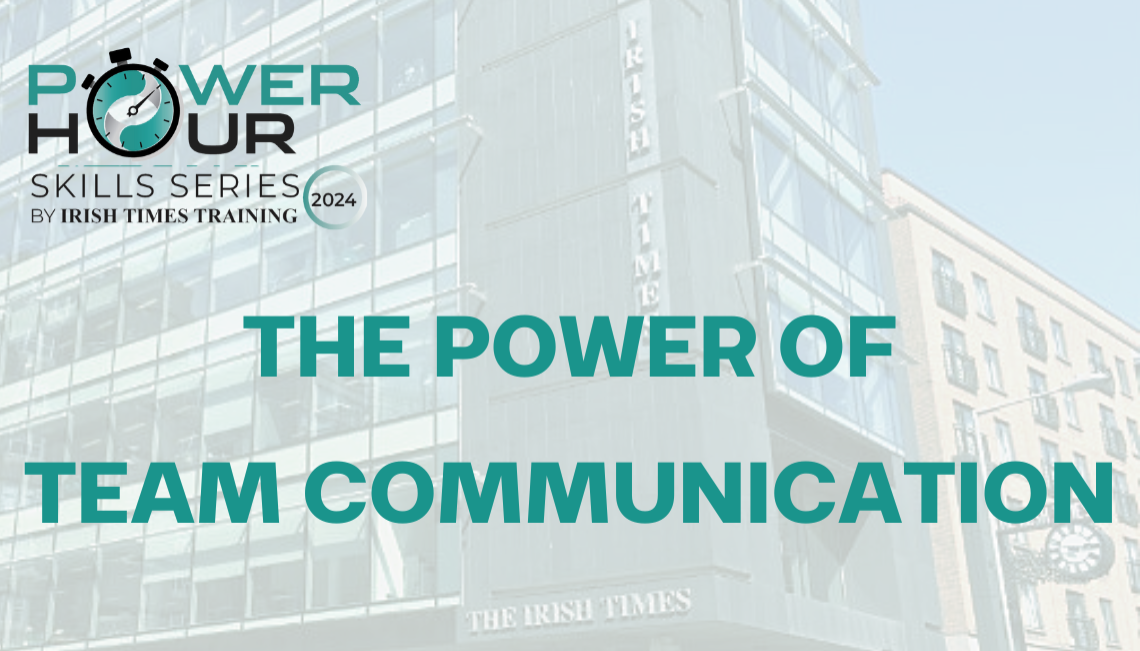Insights > Blog

The Power of Team Communication - 4 Key Take-Aways
PUBLISHED 2 MAY 2024
The Power of Team Communication
Especially in a professional setting, good communication within a team is essential to create an environment in which people can collaborate and flourish. But there is no doubt that, even if we think we've got good skills in this area, we can all improve our communication skills.
In today's lunchtime webinar, guest speaker and faculty member Neil Curran explored how strong communication skills are key to teams building strong relationships, and being truly effective in their work. Neil discussed what an effective communicator looks like and how we can engage in Conscious Communication to build strong bonds with our colleagues, be more assertive communicators and minimise the pitfalls associated with poor communication in team settings. Contributions from the audience flooded in throughout the session, and they raised some stark questions about how they can improve their own and their teams' communication skills and processes. Thankfully, Neil was on hand to provide plenty of positive options. You can watch the recording of the webinar here.
The Power of Perception
Whether we like it or not, what we communicate and how we frame it affects how others receive the message.
Consider this: Thanking someone for their contribution to a discussion might seem like an innocuous way of signalling that they have been heard. However, what if that person perceives this as a brush-off? Merely a stock phrase that is meant to shut them up and move on to the next agenda item? If we're not considerate of the context and perception of what we say, we can run the risk of undoing the aim of the interaction.
Four Key Take-Aways:
- Being attentive to our active listening means that we're taking in the information, tone and context of the speaker, not just waiting for a chance to jump in with a comment of our own.
- The Communication Intimacy Pyramid puts face-to-face interactions at the top as most impactful, with remote avenues, such as email, lower in impact.
- We all perceive and interpret the world differently, so bear this in mind if your audience doesn't appear to be engaged with what you're saying; ask them if something is worrying them - maybe you can help.
- Practise empathy and be respectful of other people's time and priorities. Not everyone works at the same pace, so being aware of team members' priorities and challenges helps you to appreciate how they work as part of the whole team.
Conflict & Misunderstandings
Truly good team communication can decrease the risk of conflict, tension and misunderstandings which can be detrimental to the team and the organisation. Making connections and interacting positively with team members and colleagues helps us to feel confident in our roles and more engaged in our work. This is great news for the organisation too as it drives productivity - good team communication improves the organisation's culture and helps to deliver on its strategies.
Ways in which effective team communication can be achieved include:
- Encouraging openness and transparency
- Honestly respecting all opinions
- Defining role & responsibilities within the team
- Allowing two-way feedback
- Prioritising team-building
- Developing a routine
- Practising empathy
- Leading by example
Effective Communication for Remote Teams
- As a remote team, you also need to think about audio and video conferencing tools.
- Consistently update team and shared documentation - cut out the risk of any team member misunderstanding the current status of projects or the business if they're relying on email threads or old/misfiled docs.Remember that the cost of miscommunication can be very high, whether in terms of money, resources or time wasted.
- Consider how the tone of your communication will be interpreted, especially if you're working with team members of different abilities, cultures and nationalities.
- If you can bring people together in person on a regular basis, even a couple of times a year, do so, and facilitate conversation to build the team dynamic. Don't underestimate the power of the water cooler moments to your team.
- Update and include everyone in information loops - whether through online or in-person meetings, or regular email updates.
- One of the primary benefits of effective communication is that it helps identify problems early so that they can be fixed with minimal disruption. This only happens if employees feel like they can truly share their feedback. Otherwise, the problems are simply going to fester.
And if you're looking to improve your own or your team's communication skills, check out details of our Communicating with Confidence course.
